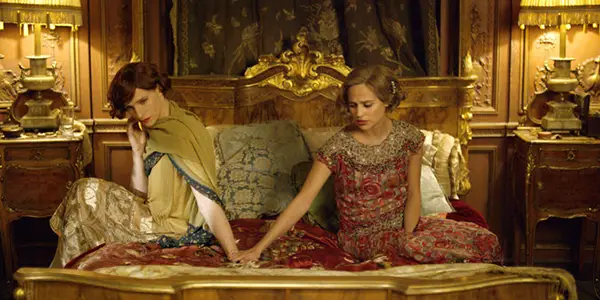Oscar Guilt: Why The Academy Rewards Those Who ‘Act Out’ Diversity

Angela Trott is a PhD Film researcher from the UK…
As another Hollywood award season gathers momentum, so too do its accompanying controversies and questions. Last year’s Academy Awards were remembered as much for the hashtag #OscarsSoWhite as they were for any of the achievements of film’s apparent best and brightest. This, coming the year after 2014’s Oscars host Ellen DeGeneres knowingly quipped before the Best Picture award was announced that: “Either 12 Years a Slave wins Best Picture, or you’re all racists.”
While this garnered a wince and a laugh from the self-congratulatory crowd, it did in fact neatly capture what appears to be a troubling trend in mainstream American cinema: the way in which it arguably makes use of the annual awards season to wave a flag for a diversity that just does not cross over into noticeable representation, either on-screen or off.

With continued debate surrounding the lack of diversity in this year’s Oscar nominations, this article examines the relationship between this criticism and the tendency for Hollywood to bestow praise and accolades upon straight, white, cisgender actors often for portraying trans and gay characters.
Recent Controversies
In the same year that 12 Years a Slave deservedly won its Best Picture Oscar, Jared Leto controversially won the Best Supporting Actor award for his portrayal of a transgender woman, Rayon, in Dallas Buyers Club, much to the disappointment of a large proportion of the trans community in the US. Fast forward two years and Eddie Redmayne is facing a similar backlash for his otherwise critically acclaimed role in The Danish Girl, which tells the story of transgender artist Lili Elbe.
Argued by many critics, including one of our writers at Film Inquiry (here), to be a woefully inaccurate portrayal of a trans woman, the film and Redmayne’s performance have nevertheless earned praise such as: a “full-immersion physical and emotional transformation” (Hollywood Reporter) and “the ultimate identity overhaul” (Variety), culminating in another Oscar nomination for its lead actor.

This comes only a year after a similar combination of controversy and reverie which surrounded Redmayne’s Oscar win for his performance as Stephen Hawking in The Theory of Everything. His performance, while undeniably accomplished, left some commentators questioning the systematic prejudices which may lead to an able-bodied actor being rewarded for playing a man with motor neurone disease, while roles for disabled actors continue to remain scarce to say the least.
The Backlash
Considering that Hollywood cinema has a depressingly poor history when it comes to the representation of anyone who isn’t white, heterosexual, cisgender and, although very slowly improving in this last one, male, it is easy to sympathise with Spike Lee and Jada Pinkett-Smith’s decision to boycott this year’s Oscars when faced with such a complete lack of racial diversity in the acting categories for yet another year.
#OscarsSoWhite and #OscarsSoMale have made a decided comeback, with social media protests such as the #AltOscarParty chiming in to highlight the remarkable work being done by filmmakers and performers who are traditionally ignored by The Academy. Ian McKellan has been the latest revered name to add his support to those speaking out about this disparity, recently highlighting in The Guardian the issue of homophobia, as well as racism, and how it affects the biggest Hollywood awards shows.
While he comments on the fact that no openly gay man has ever won an Oscar, he questions why there are so many straight actors who have been rewarded for playing gay characters, adding support to the notion that The Academy can see fit to award a portrayal of homosexuality but when it comes to accepting openly gay actors it falls foul of ingrained prejudices.
Industrial Guilt
I am not suggesting that the Academy itself is the problem, as this is clearly a much more complicated and deeply rooted systemic issue within the film industry as a whole. However, these awards represent a very public face of mainstream Hollywood and as such are arguably a platform to assuage a collective guilt over Hollywood’s historical lack of diverse representation, guilt over not doing enough to improve things in the here and now, and a guilt surrounding the shameful lack of women, people of colour, trans and gay people calling the shots in mainstream cinema.
Perhaps the Academy somehow feels that if it can wave its flag of diversity once a year by nominating or awarding a portrayal of a transgender or gay character, or every few years nominate an actor of colour and call it progress, then the exclusion of so many groups from the industry can go unnoticed for another year.
One only has to consider the marketing campaign for The Imitation Game from the lead up to 2014’s awards to get a sense of the impact that the industry suggests that awards can have. The film, a biopic of Alan Turing who solved the Enigma code during World War II but was later prosecuted for homosexuality, was critically applauded and earned Benedict Cumberbatch an Oscar nomination. The tagline, encouraging Academy voters to support the film read: ‘Honor the man. Honor the film’, standing as proof that there is a prevailing attitude among some parts of the film industry that an award can somehow substitute for true change.

In a better world and a more egalitarian industry, there would be nothing amiss about these talented actors performing these accomplished roles, and the aim of this article is not to disparage them as performers. However, it is valid to continue questioning why Hollywood consistently lets us down again and again on the diversity front.
Cheryl Boone-Isaacs, the Academy president, has been engaging with this public conversation surrounding lack of diversity at the Oscars and has promised “we’re going to do more than just talk”. While this acknowledgement of criticism and promise of change is admirable, it still bears the question of whether real change can or will come from within the Academy and its voters, or do we need to see wider industry initiatives taking shape?
Does content like this matter to you?
Become a Member and support film journalism. Unlock access to all of Film Inquiry`s great articles. Join a community of like-minded readers who are passionate about cinema - get access to our private members Network, give back to independent filmmakers, and more.
Angela Trott is a PhD Film researcher from the UK who divides her time between film watching, writing, teaching, and tea drinking in equal measure.











